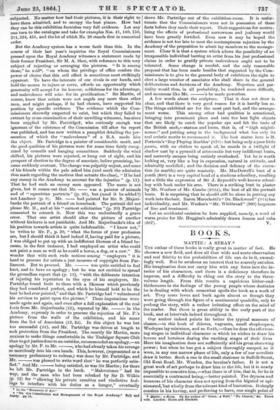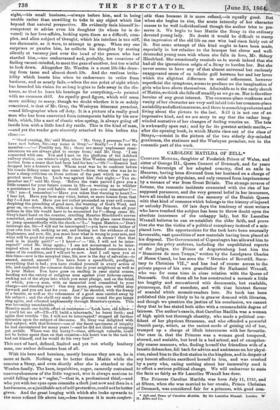BOOKS.
MATTIE : A STRAY.* THE author of these books is really great in matter of fact. He chooses a new field, and does all that wide and acute observation and real fidelity to the probabilities of life can do in it, exceed- ingly well. But he awakens an interest that he scarcely satisfies. His imagination does not carry him with any force into the in- terior of his characters, and there is a deficiency therefore in impetus, and a difficulty in eking out the story to the three- volume length. From this results a capricious hither-and- thitherness in the feelings of the young people whose destinies he is dealing with which somewhat spoils the book as a work of art. They cross loves and back again almost as though they were going through the figure of a sentimental quadrille, only to prolong the story, with a rather irritating effect on the mind of the reader. But there is great ability in the early part of the book, and at intervals indeed throughout it.
Our author indeed paints far better the typical manners of classes,—in this book of thieves, vagrants, small shopkeepers, Wesleyan lay ministers, and so forth,—than he does the effervesc- ing stages in individual character in which he wishes to draw his heroes and heroines during the exciting stages of their lives Here his imagination does not sufficiently aid his great observing power ; but when he has got a subject thoroughly steeped, as it were, in any one narrow phase of life, only a few of our novelists draw it better. Such a one is the small stationer in Suffolk Street, Old Kent Road, Mr. Wesden, the heroine's father. It is not a great work of art perhaps to draw him to the life, but it is nearly impossible to conceive him,—what there is of him, that is, for be is essentially a contracted being,—better painted. The dryness and leanness of his character does not spring from the bigoted or opi- nionated,-bat wholly from the tolerant kind of limitation. It simply consists in his having, and preferring to have, one single point of • Awe: a Stray. By the author of " Owen a Waif," "No Ohuroh," do. Three vols. London: Hunt and Blaokett.
sight,—his small business,—always before him, and in being unable rather than unwilling to take in any object which lies
beyond that natural perspective. He evidently feels himself in- competent to advise even his daughter (to whom he is de- voted) in her love-affairs, looking upon them as a difficult, com- plex, and alien subject of thought, which his intellect is too stiff, too rheumatic, as it were, to attempt to grasp. When any one surprises or puzzles him, he collects his thoughts by staring silently at vacancy just over the head of the person who has startled hitn,—too embarrassed and, probably, too conscious of feeling vacant-minded, to meet the gaze of another, but too wistful to look down. Altogether Mr. Wesden is a most life-like draw- ing from tame and almost dumb life. And the restless irrita- bility which besets him when he endeavours to retire from business, and so nearly fails, —when the one point of sight which has bounded his vision for so long begins to fade away in the dis- tance, so that he loses his bearings for everything,—is painted with no common skill. An equally good figure, which will seem more striking to many, though we doubt whether it is so subtly conceived, is that of Mr. Gray, the Wesleyan itinerant preacher, —and lithographer when off duty. It is a picture of a really good man who has been converted from intemperate habits by his new faith, which, like a sort of elastic wire-spring, is always going off inside him with a little hard dry rattle. This is the kind of man, —and yet the reader gets sincerely attached to him before the close :— " ' Good evening, Sir,' said Maurice. Mr. Gray, I presume ?'—' We have met before, Sir—my name is Gray.'—' Really! — I do not re- member—'—' Possibly not, Sir ; there are many unpleasant remi-
niscences we are always glad to escape from,' said Mr. Gray. I am connected with one. You and I met on the platform of the Ashford railway station, one winter's night, when Miss Wesden claimed my pro- tection from a snare that had been laid for her.'—' Oh !'—Maurice had dropped into a hornet's nest. Whom next was he to confront before his cousin Sidney came upon the scene ?—from whom else was he to hear a sharp criticism on those actions of the past which no one re- gretted more than he. Luck was against him that night.—' You re- member me ?' said Mr. Gray. 'Before the train parted I gave you a
little counsel for your future course in life—a warning as to whither a persistence in your evil habits would lead yon—you remember ?'— ' Oh ! yes—I remember.'—' Have you taken that warning to heart ?- I fear not. Have you been any wiser, better, or more honest from that day P—Ifear not. Have you not rather proceeded on your evil course, despising the preaching of good men, the warning of God's Word, and gone on, on—down, down, without a thought of the day when all your actions in this life would have to be accounted for r—Bang came Mr. Gray's hard hand on the counter, startling Maurice Hinchford's nerves somewhat, and causing innumerable articles in the glass cases thereon to jump spasmodically with the shock.—' I—' began Maurice.—' Don't interrupt me, Sir—I will not be interrupted !—yon have come hither of your own free will, seeking us out, and fearing not the evidence of our displeasure, and now, Sir, you must hear what is wrong in your acts, and what will be good for your soul. Do you know, oh sinner ! that that soul is in deadly peril?' — I know—' — Sir, I will not be inter- rupted?' cried Mr. Gray again ; I am not accustomed to be inter- rupted when I am endeavouring to awaken a hardened conscience to a sense of its condition, and I will not be now. And I call upon you at this time—now is the accepted time, Sir, now is the day of salvation—to amend, amend, amend ! You have been a spendthrift, profligate, everything that is bad ; you have studied yourself in every action of life, and neglected the common duties due to your neighbour as well as to your Maker. You have gone on smiling in your sinful course, heeding not the outcry of religions men against your hideous career, racking not of the abyss into which you must plunge, and on the brink of which, you—a man, with an immortal soul committed to your charge—are standing now ! One step more, perhaps, one wilful step forward, and you are lost for ever. Lost!' he shouted, with the frenzy of a fanatic, as well as the vehemence of a good man carried away by his subject ; and the shrill cry made the glasses round the gas lamps ring again, and vibrated unpleasantly through Maurice's system. This
was becoming unendurable Maurice made one feeble effort at resistance.—' Look here, old fellow— if you'll let me off—I'll—I'll build a tabernacle,' he burst forth; and again that terrible ' Sir, I will not be interrupted!' stopped all further intrusion upon the subject of discourse. Mr. Gray was delighted with that subject, with that listener—one of the finest specimens of iniquity he had encountered for many years !—and he did not think of stopping yet awhile. Where was the hurry?—time, although valuable, could not be better spent than on that occasion—his heart was in the task he had set himself, and he would do his very best !"
This sort of bard, defined, limited and yet not wholly leathery man, our author delineates best of all.
With his hero and heroines, mostly because they are so, he is more at fault. Nothing can be better than Mattie while she remains a Stray, and even shortly after she is attached to the Wesden family. The keen, inquisitive, eager, earnestly restrained unscrupulousness of the little vagrant, who is always anxious to avoid falling into a " reglar,"—that is, a professional thief,—and who yet with her eyes open commits a theft just now and then in a hard season, as a justifiable act of self-protection, could not be better given. And the great longing with which she looks upwards to the more refined life above her,—less because it is more comfort- able than because it is more refined,—is equally good. But when she begins to rise, the acute intensity of her character ceases to be well individualized though the author tries to pre- serve it. We begin to lose Mettle the Stray in the ordinary devoted young lady. No doubt it would be difficult to stamp the impression of the old life on one who had risen fairly out of it. But some attempt of this kind ought to have been made, especially in her relation to the brusque but clever and well- descended young man with whom she falls in love, Mr. Sidney Hinchford. She occasionally reminds us in words indeed that she had all the ignominious origin of a Stray to burden her. But she never seems to have any of that almost universal but curiously exaggerated sense of an infinite gulf between her and her lover which the slightest difference in social refinement, however superficial the symptoms, seems to produce on the imagination of girls who love above themselves. Admirable as is the early sketch of Mattie, we think she falls off steadily as we go on. Nor is the oth er heroine of any great interest. The common-place weakness and vanity of her character are very well inlaid into her common-place amiability and affectionateness, and there is somethi ngcoli erent and living about the picture to the last. Sill it is not one of an impressive kind, and we are sorry to say that the rather long- winded narrative of her changes of feeling wearies us. The tale is awkwardly spun oat ; and by far its greatest artistic merits,— after the opening book, in which Mattie rises out of the class of Strays,—consist in the picture of the two elderly dry-minded gentlemen, the stationer and the Wesleyan preacher, not in the romantic part of the work.































 Previous page
Previous page